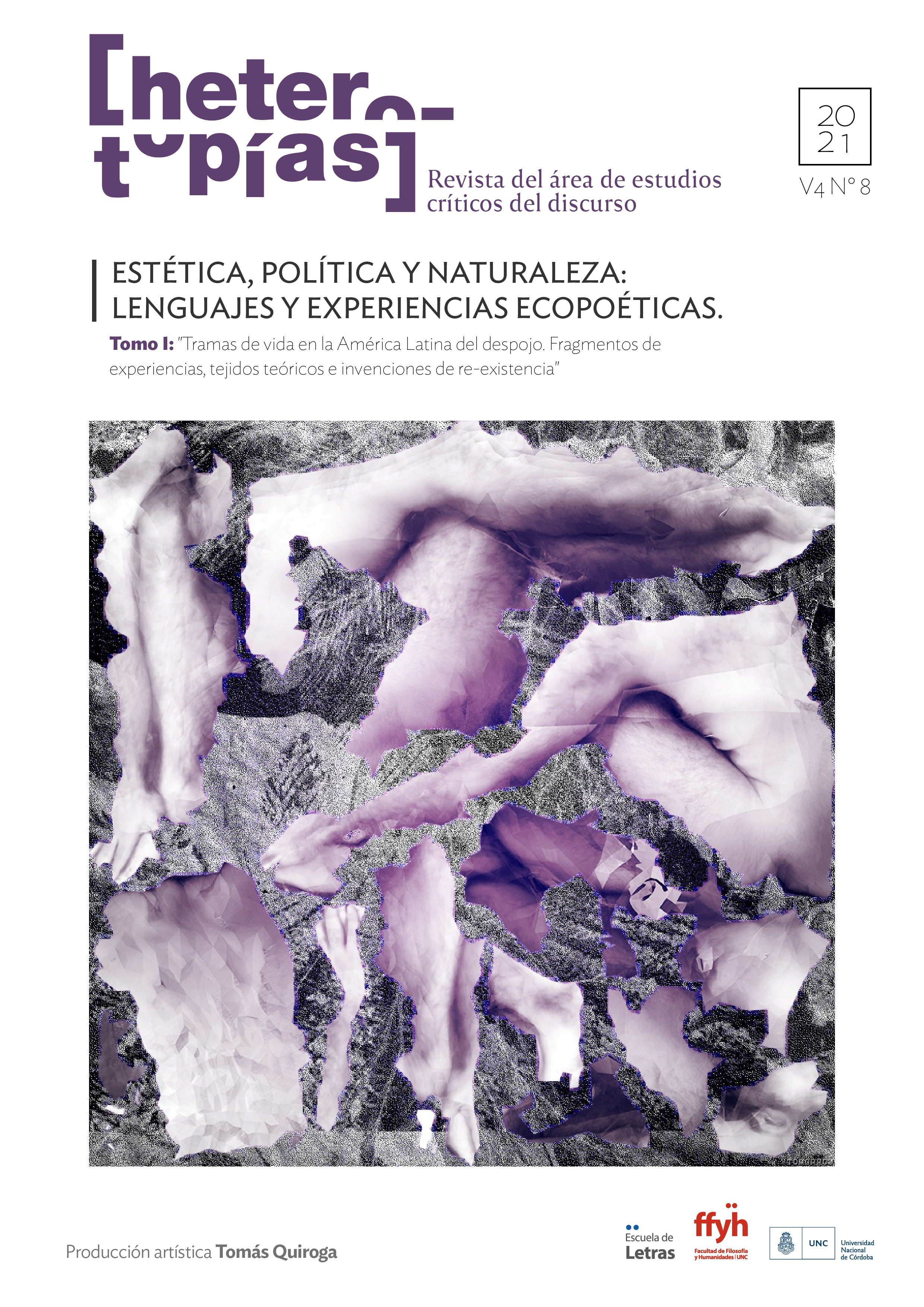Extractive alchemy: sovereign desire in EPHPEUM
Main Article Content
Abstract
Through the work of Mauricio Odreman EFPEUM, this text analyzes the link between sovereignty and extractivism in 20th century Venezuela. Based on an investigation of some images and scenes of film work, it is sought to show the relationship of state fetishism, which arose thanks to the oil exploitation and the modernization process that this generated, with the exploitation of nature.
Downloads
Article Details

This work is licensed under a Creative Commons Attribution-NonCommercial-ShareAlike 4.0 International License.
Those authors who have publications with this journal, accept the following terms: Those authors who have publications with this journal, accept the following terms:
a. The authors will keep their copyright and guarantee to the journal the right of first publication of their work, which will be simultaneously subject to the Creative Commons Attribution - Non-Commercial - Share Alike (by-nc-sa) Attribution License; no commercial use of the original work or any derivative works is allowed, the distribution of which must be done with a license equal to the one that regulates the original work.
b. Authors may adopt other non-exclusive license agreements for the distribution of the published version of the work (e.g., deposit it in an institutional telematic archive or publish it in a monographic volume) provided that the initial publication in this journal is indicated.
c. Authors are allowed and recommended to disseminate their work through the Internet (e.g. in institutional telematic archives or on their website) before and during the submission process, which may lead to interesting exchanges and increase the number of citations of the published work. (See The effect of open access).
How to Cite
References
Adorno, T. (1975). Mínima Moralia. Trad. de Norberto Silvetti Paz. Caracas: Monte Ávila.
Almandoz, A. (2012). Modernidad Urbanística y Nuevo ideal Nacional. En Almandoz, A (Comp). Caracas: de la metrópoli súbita a la meca roja (pp. 95-105). Quito: Olacchi.
Arreaza Calatrava, J. T. (2011). Canto al ingeniero de Minas. Anzoátegui: Fondo Editorial del Caribe.
Benjamin, W. (1982). Experiencia y pobreza. En Benjamin, W. Discursos interrumpidos. Trad. Jesús Aguirre (pp. 165-174). Madrid: Taurus.
Benjamin, W. (1998a). Sobre algunos temas en Baudelaire. En Benjamin, W. Poesía y capitalismo, Trad. Jesús Aguirre (pp. 123-170). Madrid: Taurus.
Benjamin, W. (1998b). Fourier o los pasajes. En Benjamin, W. Poesía y capitalismo. Trad Jesús Aguirre (pp. 173-176). Madrid: Taurus.
Benjamin, W. (1998c). El Flâneur. En Poesía y capitalismo. Trad. Jesús Aguirre (pp. 49-85). Madrid: Taurus.
Benjamin, W. (2009). Tesis sobre la historia y otros fragmentos. Trad. Bolivar Echevarría. Rosario: Prohistoria.
Buck-Morss, S. (2001). Dialéctica de la mirada: Walter Benjamin y el proyecto de los pasajes. Madrid: La Balsa de la Medusa.
Blackmore, L. (2017). Spectacular Modernity: Dictatorship, Space, and Visuality in Venezuela, 1948-1958. Pittsburgh: University of Pittsburgh Press.
Coronil, F. (2002). El Estado mágico. Naturaleza, dinero y modernidad en Venezuela. Caracas: Nueva Sociedad.
Garmendia, S. (1992). Los Habitantes. Caracas: Monte Ávila.
González Rincones, S. (1929). La yerba santa. París: A. Fabre.
Harvey, D. (2017). El cosmopolitismo y las geografías de la verdad. Madrid: Ediciones Akal.
Heidegger, M. (2001). La pregunta por la técnica. En Conferencias y artículos (pp. 12-28). Madrid: Ed. del Serbal.
Jameson, F. (2009). Arqueologías del futuro: el deseo llamado utopía y otras formas de ciencia ficción. Madrid: Ediciones Akal.
Lecuna, V. (2018a) Reinas venezolanas del siglo XX: populismo, abstracción y Estado. Cuadernos de Literatura, 43, 75-96.
Lecuna, V. (2018b). Darse cuenta: ópera travesti. En Studia Iberica at Americana: journal of Iberian and Latin American literary and cultual studies, 5, 123-140.
Mitchell, T. (2012) Society, Economy, and the State Effect. En A. Sharma y A. Gupta (comp). The Anthropology of the State (pp. 76-97). Ithaca: Cornell University Press.
Odreman, M. (Director). (1965). EFPEUM . Coofilven Producción.
Pinardi, S. (2012). Residuos y cegueras: miradas desde una Caracas sitiada. Voz y escritura. Revista de estudios literarios, 20, 53-71.
Pérez Oramas, L. E. (2020). Caracas, escena constructiva. Trópico absoluto. Caracas. Recuperado de https://tropicoabsoluto.com/2020/04/08/caracas-escena-constructiva/
Picón Salas, M. (1983). Viejos y nuevos mundos. Caracas: Biblioteca Ayacucho.
Quintero, I. (1989). El ocaso de una estirpe. Caracas: Alfadil.
Ramos, J. (2011). Ficciones del sujeto moderno (Un diálogo improbable entre Walter Benjamin y Fernando Pessoa). Sujeto al límite: ensayos de cultura literaria y visual (pp. 125-150). Caracas: Monte Ávila.
Sánchez, R. (2006). Dancing Jacobins. Dancing Jacobins: A Venezuelan Genealogy of Latin American Populism. New York: Fordham University Press,
Taussig, M. (2015). La magia del Estado. Trad. Juan Carlos Rodríguez. México: Siglo Veintiuno Editores.
Urbaneja, D. B. (1993). El sistema político gomecista. En Pino Iturrieta (Comp). Juan Vicente Gómez y su época (pp. 59-79). Caracas: Monte Ávila.
Vallenilla Lanz, L. (1991). Cesarismo democrático y otros textos. Caracas: Biblioteca Ayacucho.
